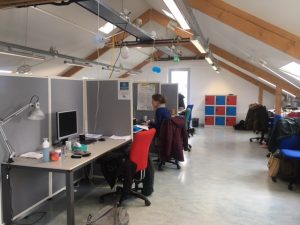Thesis Life: Let’s Get Started!
Hi everyone! My name is Yurike, from Jakarta, the capital city of Indonesian archipelago. I am a second year student of Master Nutrition and Health (MNH), specializing in Nutritional Physiology and Health Status. Thankfully, I already did my thesis (for a sweet eight-month period), started in May 2017 and finished in January 2018. I did my thesis in Human and Animal Physiology (HAP) Department, focusing in transcriptomic and proteomic levels. To be quite honest, my specialisation is not related to molecular stuff at all. That’s a cool thing about doing thesis here in WUR, you can always try a new experience to gain more knowledge besides your courses.
How do we start?
Ok, to start, first you have to decide what you really want to do with your thesis. Do you already have something in mind? If so, you can talk to your study adviser for a possible supervisor in the department you are aiming for. If you completely have no idea what you are going to do, do not be afraid! WUR has a so-called Thesis shop. You can find a lot of possible upcoming researches and find something that fits your learning objectives for your thesis. When you find one topic that interests you, you can always contact the supervisor for a feasibility. For thesis in Human Nutrition, here is the thesis shop.
If you already aiming one department but you do not know what is going on in that department, fear not. You can contact the department to ask for possible thesis projects that are going on in your desirable period. Then, make an appointment with them, and they will explain all possible projects to you. You will have time to think about which project you would like to choose.
When I was about to start with my thesis, I did not know exactly what I wanted to do. I only knew that I wanted to try to work with genes and tissues in molecular levels.
Thus, HAP department was a great choice for me, in which I learned so many new laboratory techniques that I did not even know exist before. It really did make me feel like I am a real scientist, which is pretty cool!
After getting the topic you wish for: Introduction
Soon enough, you will get in touch with your daily supervisor and you will have a discussion about when and how to start. You will have to fill in a thesis contract, and the best part is, you get to choose your holiday period! Which, to me, is somehow challenging actually. I personally had to arrange my time really carefully and sacrificed my summer holiday for thesis period. Because when you are doing a lab work, sometimes it has to be continuously in order to use only fresh reagents, cells, etc, so it can be tricky with the time. Of course you do not want to spend too much time in the lab if things go wrong. Manage your time wisely and most importantly, discuss it with your supervisor! They are kind and will always help you when you are in need.
Next, you can sign the thesis contract and get prepared to get into the new environment of your department. For me, HAP was not familiar at all since I spent my time mostly in Helix because that is where the Human Nutrition (HNE) Department works. You will work in the working room of your department (for me at HAP, we called it the “Attic” because it is a literal attic, but a super cosy version).
Do not forget to introduce yourself to the whole department, either to the staff or the other students, and make friends with them. It is very helpful for you to know your new thesis family for further needs (yes, you will most likely have tons of questions in your head to be answered, whether it is related to your thesis topic or just wondering where the free-coffee card is and how to use it).
Last but not least, it is helpful if you already prepare your topic before you really start. Because, you will write your thesis proposal which will be a determinant of your fate in the thesis period. Good luck in finding a suitable thesis topic and hope this article is insightful! 🙂



